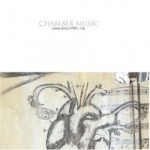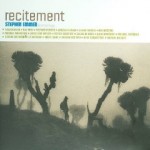When did setting poetry to music become cool again, you ask? Well, it didn’t, of course. Ask around on the street, and most folks would likely rather rip their eyeballs out with a plastic fork than listen to that sort of thing. Chamber Music and Recitement aren’t for them, but listeners more amenable to a poetry/music pairing might want to check out these two albums, assembled and composed by Fire Records head James Nicholls and Dutch musician Stephen Emmer, respectively.
 Performed by an eclectic selection of bands and artists, Chamber Music (Fire) scores James Joyce’s 1907 poetry collection of the same name. A virtual who’s-who of indie-rock luminaries—including the Minus 5, Mike Watt, Mercury Rev, Flying Saucer Attack, Kinski and Bardo Pond—spans these two discs, which are beautifully packaged though criminally skimpy on track-by-track credits. Most of the songs here, such as Venture Lift’s retooling of Syd Barrett’s 1970 interpretation of “Golden Hair,” offer a simple framework for the equally straightforward verse, written years before Joyce’s more infamous experimental prose. What’s initially surprising is how well Joyce’s formal lyrics fit into traditional pop forms, but that makes sense on reflection. Chamber Music, as its title suggests, was intended as a collection of lyrics by a writer who was well-versed in the popular music of his day and, by all accounts, had an excellent tenor voice, too.
Performed by an eclectic selection of bands and artists, Chamber Music (Fire) scores James Joyce’s 1907 poetry collection of the same name. A virtual who’s-who of indie-rock luminaries—including the Minus 5, Mike Watt, Mercury Rev, Flying Saucer Attack, Kinski and Bardo Pond—spans these two discs, which are beautifully packaged though criminally skimpy on track-by-track credits. Most of the songs here, such as Venture Lift’s retooling of Syd Barrett’s 1970 interpretation of “Golden Hair,” offer a simple framework for the equally straightforward verse, written years before Joyce’s more infamous experimental prose. What’s initially surprising is how well Joyce’s formal lyrics fit into traditional pop forms, but that makes sense on reflection. Chamber Music, as its title suggests, was intended as a collection of lyrics by a writer who was well-versed in the popular music of his day and, by all accounts, had an excellent tenor voice, too.
 Recitement (Supertracks) presents a more traditional collection of poetry and prose readings (some new, some archival) set to original music by Emmer. The combination of texts and readers here is dizzying. Lou Reed reads Paul Theroux, Richard Burton reads Gerard Manley Hopkins, and Blonde Redhead’s Kazu Makino reads Yoko Ono; a few writers, Allen Ginsberg and Jorge Luis Borges among them, read themselves. Recitement is set to reserved if slickly produced music, but only on a couple of string-and-brass-laden tracks does it shoot for “soaring” and verge on “syrupy.” What’s interesting about Recitement are its small touches, like a quick blast of noise in an otherwise serene setting or the revelation that Reed’s nasal recitation sounds more interesting when he reads someone else’s words. As on Chamber Music, the tension produced when the texts meet the music provides the deepest enjoyment. [www.firerecords.com; www.recitement.com]
Recitement (Supertracks) presents a more traditional collection of poetry and prose readings (some new, some archival) set to original music by Emmer. The combination of texts and readers here is dizzying. Lou Reed reads Paul Theroux, Richard Burton reads Gerard Manley Hopkins, and Blonde Redhead’s Kazu Makino reads Yoko Ono; a few writers, Allen Ginsberg and Jorge Luis Borges among them, read themselves. Recitement is set to reserved if slickly produced music, but only on a couple of string-and-brass-laden tracks does it shoot for “soaring” and verge on “syrupy.” What’s interesting about Recitement are its small touches, like a quick blast of noise in an otherwise serene setting or the revelation that Reed’s nasal recitation sounds more interesting when he reads someone else’s words. As on Chamber Music, the tension produced when the texts meet the music provides the deepest enjoyment. [www.firerecords.com; www.recitement.com]
—Eric Waggoner






